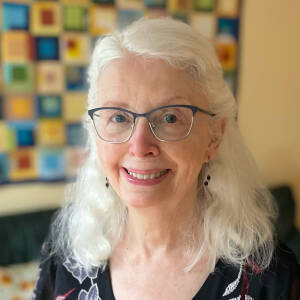A Different Kind of Medal
I have considerable information about the military service of the men in my extended family, from a Brigadier General in the Revolutionary War to more recent conflicts, but much less about the lives of my female forebearers. The lack of documentation about them made this thoughtful gift from my cousin L, when she and her husband visited us in August, all the more thrilling.
Our grandmother had 14 grandchildren, and she tried to leave each of us something special in her will. This academic medal, awarded to her mother, Annie Elizabeth Bottimore, was no doubt one of her treasures. My cousin L inherited the medal and now has passed it on to me, and I am touched by her generosity.
Annie Elizabeth, the middle child of five in a family headed by a judge and a well-read mother, was a student in 1879 at Sullins College in Bristol, Virginia, founded about a decade earlier as a high school and junior (two year) college for girls. She was a month short of her 19th birthday when she received this honor.
The gold-plated medallion, with accompanying chain, was the James Medal. "Composition" is engraved on the back, along with the college's initials and state; perhaps other James Medals were awarded for other subjects. I would give almost anything to be able to read what she wrote to earn this honor!
One of the primary reasons I grew up surrounded by books and became a lover of reading goes back to the influence of this great-grandmother on her daughter, my grandmother, and on her only granddaughter, my mother (she also had five grandsons). I have tangible evidence in a tattered copy of a 1904 children's book titled Poems Every Child Should Know, with a dedication in the front to my mother - "Mary Elizabeth, Xmas 1929, from Mama," as Annie Elizabeth was known to her children and grandchildren alike.
My mother was 10 when she received this treasure, and her maternal grandmother was 69. They had nearly nine more years to enjoy it together before her grandmother's death. Twenty-five years later, my mother passed the book on to me at Christmas, just a few months short of my seventh birthday, and although I've not yet read every poem in it, I enjoyed many of them throughout my childhood.
At 331 pages, including the index, just one illustration, and 187 poems that most people today would consider too difficult for children, this book probably wouldn't sell well now, particularly with the author's comments that "With the exception of seven, they are short enough for children to commit to memory without wearying themselves or losing interest in the poem" and "I make claim for this collection that it is made up of poems that the majority of children will learn of their own free will."
How many children memorize poems today, I wonder?
(For those interested in size, the medal is just short of 2 inches / 5 centimeters tall, and 1.5 inches / just over 3 cm wide. For those interested in books, Mary E. Burt was the editor of the above-mentioned book, and the subtitle is "A Selection of the Best Poems of All Times for Young People." It was published by Grosset & Dunlap, New York, and copyright 1904 by Doubleday, Page & Company. The following enigmatic note follows the copyright information: "All rights reserved, including that of translation into foreign languages, including the Scandinavian.")

Comments
Sign in or get an account to comment.


